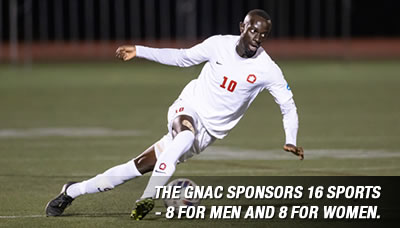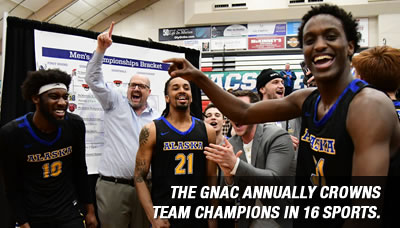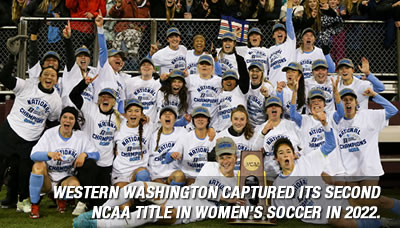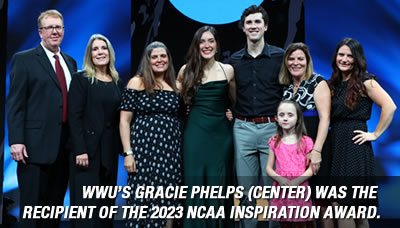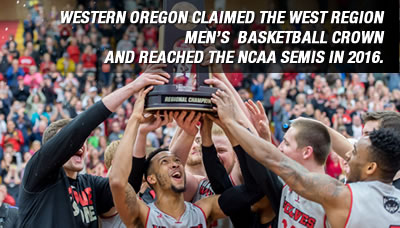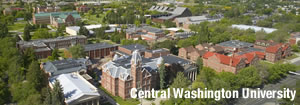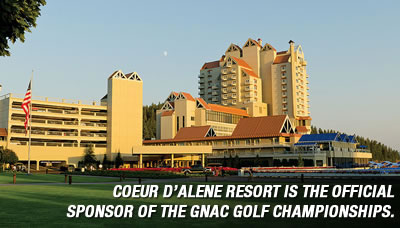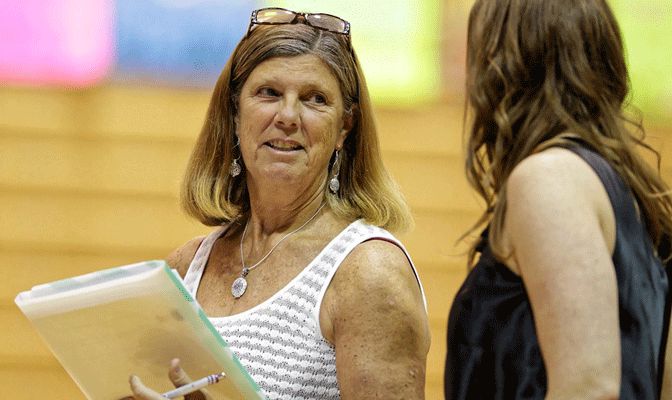SPU Gymnastics: 40 Fabulous Years Under Laurel Tindell
Thursday, April 9, 2015 SEATTLE – Deni Boswell was a three-time national champion and nine-time All-American gymnast. But when she lost her mom to cancer just before Boswell's senior year at Seattle Pacific, her rock to lean on was Laurel Tindall.
Corrie McDaniel was a four-time All-American. But after breaking both of her elbows a week before the 2004 nationals, her guide to the light at the end of a long comeback tunnel was Laurel Tindall.
Texie Gregory was an all-conference performer on the uneven parallel bars. But when needing a lighter moment in a sport whose demands are only truly understood by those who live and breathe them every day, the one person often providing that lighter moment, whether in the gym or on a monotonous drive through Illinois farm country …
… was Laurel Tindall.
Now in her 40thseason at the helm, there should be no shortage of gymnastics stories about the imminently successful head coach. In fact, the hundreds of athletes who have gone through her gym all probably have a story or two or 10 to share.
Count Boswell (1995-98), McDaniel (2002-05) and Gregory (2009-12) among those hundreds of athletes.
But gymnastics aside, the stories they share just as eagerly are recollections of Tindall the mom who let them cry on her shoulder. Tindall the mentor who knew what they were capable of doing even before they knew it.
And yes, Tindall the coach, who doesn't lower her standards or expectations – but also doesn't give up on those who are genuinely trying to get there.
 "A quiet, consistent presence that, whether we liked it or not, was steady and calm, and we always knew what to expect," said Boswell (now Maxwell), who won national titles on the bars in 1986 and 1988, the '88 all-around crown, and was part of the 1997 USA Gymnastics national collegiate championship team. "Looking back after 20 years, I can see better who she was for me as an athlete and as a person."
Added Gregory, "There's a quote out there that says, 'Whether you think you can or think you can't, you're right.'
"Laurel was just usually right when she told us we could."
INFLUENCED BY A LEGEND
Maybe that's because Tindall was buying into that philosophy even before she was Laurel Tindall.
Back in the early 1970s, she was Laurel Anderson, already an accomplished collegiate gymnast, having won a national vault title for the University of Washington. But even at that time, she had a premonition that her future was elsewhere.
"There was so much red tape and classes were so big," she said. "I was going to classes, but I didn't know what I was going to major in. I couldn't see myself finishing there."
At the time, Tindall's club team was training at Seattle Pacific. She already was well acquainted with Dr. Ken Foreman, the Falcons' legendary track and field coach and widely regarded as the founder of the school's athletics program. She and Foreman's son were in the same graduating class at nearby (and long-since closed) Queen Anne High School.
Neither she nor gymnastics were part of then-Seattle Pacific College. But that was about to change.
"Ken was very influential, saying this was a sport we could be successful in as a small college. That was his philosophy of excellence," Tindall said. "This was a sport where we didn't need 30 people. With a small number of people, we could be excellent in it."
A small number it was – six, to be precise – when the program began in the fall of 1973, with Virginia Husted at the coaching helm. (Husted later would coach the Falcons through their first two season full varsity seasons of women's basketball.) Anderson, then a junior, and freshman Debbie Halle led SPC to the Northwest Regional title by nearly six points in front of Washington, and the Falcons went on to place fifth at nationals. George Lewis, as much of a marquee name for gymnastics coaches as Foreman was for track, took over the following season, as Anderson capped her career with another national vault title. A few months later, she took charge of the still-fledgling, but already high-flying Falcons – and has been ever since. Does it seem like only yesterday? "Probably not yesterday – my memory goes back a little more than that," Tindall said, laughing. "But the years kind of do blend together." A 'BELIEVING REALIST'No matter what the sport – team or individual, in the spotlight or under the radar – there are coaches who simply can't communicate without screaming. Some are even successful with that style. Laurel Tindall is at the other end of the spectrum. And there's certainly no arguing that in 40 seasons, she has been just as successful with her much quieter approach. "Yeah, the kids say I'm much more mellow (the previously)," she said, laughing again. "Or they'll tell me, 'You never let us get away with stuff like that.' But I'm not a yeller. If I'm mad at someone, I'll probably get quiet more than anything else." 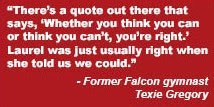 Indeed, rather than expending a bunch of negative energy on screaming, Tindall has preferred using her coaching energy to emit more productive vibes – productive, as in the Falcons making it to nationals 33 times in the past 34 years, winning it all in 1986, 1992, and 1997. The 33rd of those trips is to Philadelpia for this weekend's USA Gymnastics Collegiate Championships, which begin on Friday and conclude on Sunday."To me, Laurel is a believing realist," Gregory said. "She has the uncanny ability to see what the viable options are and to drive her athletes toward those goals. … She never requested the impossible and always focused on progressing toward the end goals." Corrie McDaniel (now Fletcher) sees Tindall's style now reflected in her own work as a pediatrician. "Laurel has taught hundreds of girls … how to achieve more than they thought they were capable of, how to push through defeat and come out as a bigger person on the other side," McDaniel said, "and most importantly how as a team you can accomplish more as an individual. "Much of my philosophy and approach to teamwork and collaboration, the value of each individual as contributing to the team, trace back to the values that Laurel instilled in me in college," McDaniel added THE ULTIMATE PERFECT FIT Tindall always figured she would be a gymnastics coach. That she would coach at the college level, coach for 40 years, and spend all 40 at the same place weren't necessarily part of the plan. Now 62, she says she wouldn't mind finding a way to cut back on some of her long hours that she spends between her SPU team and her Falcon Gymnastics Club team.Still, Tindall can't imagine doing anything else – or doing it anywhere else. "One of the things I really like here is the ability to determine more what you're doing," she said. "You're not tied to the big-school mentality. I never wanted to go out recruiting all summer. At big schools, they spend half of their summer on the road recruiting, and once I had a family, I wanted to be home in the summer." There's no getting around the fact that athletes have evolved during Tindall's 40 years. Lots of things compete for their time now. "They have other opportunities, and sometimes, they're just not as wholly into it as we would like them to be," Tindall said. "Kids are just different now, and you have to adapt to that." Certainly, Tindall's coaching success stories include many national champions (26 of them), All-Americans (179), and other award winners. But there are hundreds of others who never got their hands on hardware. Yet, many of their careers have been just as satisfying to her, if not more so. Indeed, rather than expending a bunch of negative energy on screaming, Tindall has preferred using her coaching energy to emit more productive vibes – productive, as in the Falcons making it to nationals 33 times in the past 34 years, winning it all in 1986, 1992, and 1997. The 33rd of those trips is to Philadelpia for this weekend's USA Gymnastics Collegiate Championships, which begin on Friday and conclude on Sunday."To me, Laurel is a believing realist," Gregory said. "She has the uncanny ability to see what the viable options are and to drive her athletes toward those goals. … She never requested the impossible and always focused on progressing toward the end goals." Corrie McDaniel (now Fletcher) sees Tindall's style now reflected in her own work as a pediatrician. "Laurel has taught hundreds of girls … how to achieve more than they thought they were capable of, how to push through defeat and come out as a bigger person on the other side," McDaniel said, "and most importantly how as a team you can accomplish more as an individual. "Much of my philosophy and approach to teamwork and collaboration, the value of each individual as contributing to the team, trace back to the values that Laurel instilled in me in college," McDaniel added THE ULTIMATE PERFECT FIT Tindall always figured she would be a gymnastics coach. That she would coach at the college level, coach for 40 years, and spend all 40 at the same place weren't necessarily part of the plan. Now 62, she says she wouldn't mind finding a way to cut back on some of her long hours that she spends between her SPU team and her Falcon Gymnastics Club team.Still, Tindall can't imagine doing anything else – or doing it anywhere else. "One of the things I really like here is the ability to determine more what you're doing," she said. "You're not tied to the big-school mentality. I never wanted to go out recruiting all summer. At big schools, they spend half of their summer on the road recruiting, and once I had a family, I wanted to be home in the summer." There's no getting around the fact that athletes have evolved during Tindall's 40 years. Lots of things compete for their time now. "They have other opportunities, and sometimes, they're just not as wholly into it as we would like them to be," Tindall said. "Kids are just different now, and you have to adapt to that." Certainly, Tindall's coaching success stories include many national champions (26 of them), All-Americans (179), and other award winners. But there are hundreds of others who never got their hands on hardware. Yet, many of their careers have been just as satisfying to her, if not more so. 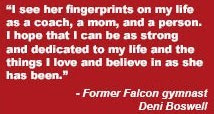 "I really like the kids who come here and still want to learn and want to make their level better and improve on that," she said. "You come to college, and it's not the end of the road. It's just the start of a different road." When that road ends – and, at least from a competitive standpoint, it does end – Tindall's hope for her athletes is the same now as it has been since 1975. "When you get to the end of four years, you want to have no regrets," she said. "You can still have a great experience and never step foot on the competition floor because you have challenged yourself and pushed yourself, and have been with a great group of people." Great groups of people who, at Seattle Pacific, are led today by the rock, the mentor, the mom ... and yes, the coach who is Laurel Tindall. Just as she has led them for the past 40 years. "I really like the kids who come here and still want to learn and want to make their level better and improve on that," she said. "You come to college, and it's not the end of the road. It's just the start of a different road." When that road ends – and, at least from a competitive standpoint, it does end – Tindall's hope for her athletes is the same now as it has been since 1975. "When you get to the end of four years, you want to have no regrets," she said. "You can still have a great experience and never step foot on the competition floor because you have challenged yourself and pushed yourself, and have been with a great group of people." Great groups of people who, at Seattle Pacific, are led today by the rock, the mentor, the mom ... and yes, the coach who is Laurel Tindall. Just as she has led them for the past 40 years.
|

-
Monday, April 13, 2015
GNAC Insider: Listen to Episode 61 on iTunes
-
Monday, April 13, 2015
Sellevold, Levin Lead WWU Softball to Team of the Week
-
Monday, April 13, 2015
Huge Weekend Earns Miller Player of the Week Honors
-
Thursday, April 9, 2015
SPU Gymnastics: 40 Fabulous Years Under Laurel Tindell
-
Tuesday, April 7, 2015
GNAC Insider: Head to GNAC.TV to Hear Episode 60
-
Monday, April 6, 2015
Hilyard, Pratt, 9 Others Earn GNAC Weekly Awards
-
Monday, April 6, 2015
MSUB Softball Earns Team of the Week with 3 Wins
-
Monday, March 30, 2015
GNAC Insider: Listen to Episode 59 on GNAC.TV
|

